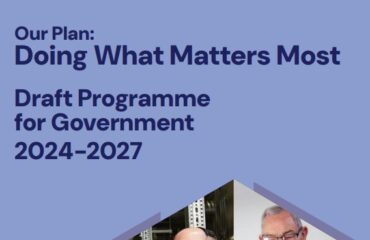The Agriculture (Wales) Bill – getting support right (part 2)

The new Agriculture (Wales) Bill introduced in September 2022 has the potential to profoundly change Welsh farming, food production and rural areas. But to deliver positive changes the Bill’s approach to support – both payments and advice – needs to be rethought. We need to be wary of abandoning ‘public money for public goods’, creating an unfortunate ‘one size fits all’ approach, establishing narrow grounds for payments, being too simplistic when considering the polluter pays principle and the restructuring of Farming connect (again some of which were mentioned in the ETRA Committee report on Agriculture (Wales) Bill). This blog post builds on the weaknesses of the current Bill we developed in our oral evidence at the Senedd’s Economy, Trade, and Rural Affairs Committee on 09/11/2022. It follows from our previous blog post which detailed our first three concerns and explained how we need to move past Sustainable Land Management as an organising principle for Welsh Agriculture Policy.
- The Bill goes back on the governmental promise of delivering ‘public money for public goods’
Similar to England’s Sustainable Farming Incentive, payments are to be for farmers to deliver actions under the Sustainable Farming Scheme (the main proposed support scheme) towards SLM objectives. Naturally, this ensures certainty and stability to the farmers – provided they undertake the agreed actions, they will receive the corresponding payments. This provides a safety net, e.g. in case of extreme weather events or human intervention impeding the delivery of intended objectives.
However, the corollary is that there is less incentive to actually deliver specific outcomes and the objectives may never be achieved, e.g. if the actions undertaken are insufficient or ineffective, potentially negatively impacting the environment. This is the nature of a ‘payments for actions’ approach that was criticised under the EU’s Common Agricultural Policy, including by the UK. A mixed approach, e.g. with payments for actions, milestones and eventual outcomes, can be more effective – providing some certainty for farmers and incentivising desired outcomes.
Further, there is also no obligation for the Minister to provide support, whilst this was an obligation under the CAP. This could create uncertainty for farmers. Such uncertainty could be minimised by funding support on a multi-annual framework.
- A ‘one size fits all’ approach
At the moment, the Bill adopts a ‘one size fits all’ approach rather than considering differences between farms and farmers. For instance, this could lead to the situation where some are excluded from financial support (or receive it without good cause), where the objectives are inappropriate, or where the supports are unsuitable or inadequate. It is important to consider the following two points when designing agricultural policies and financial support:
- Which farms? Importance of looking at the size of farms but also their geographical situation (hill, upland, less favoured areas etc); and
- Which farmers? Importance of generation renewal and placing emphasis on young farmers, new entrants as well as women in farming.
- The purposes/grounds to support agriculture are narrow
Although the purposes encompass important focus points and are not exhaustive, some significant gaps can be identified. There is no content on:
- Soil quality or health
- Net zero
- Regenerative agriculture including agroecology, permaculture, low-input, biodynamic, agroforestry and social agriculture, organic, grass/pasture fed, mixed crop-livestock systems and nature-based solutions more generally
- Food security or agri-food democracy
- Socio-ecological services
The overall aim would be to maximise all of the above purposes (as well as the ones proposed in the Bill) in a holistic manner to ensure social-ecological resilience – considering the whole of the agriculture-food supply chain and also going beyond the Bill’s reference to ecosystem resilience. Taking stock from the Well-Being of Future Generations Act in how to undertake this would be positive as issues arise in implementation, but having strong, ambitious objectives and corresponding obligations is important. If the obligations are too vague then focus may be placed on a few or they may effectively be ignored. This also links to the need to have multiple concurrent KPIs and targets for each objective, when monitoring their implementation and outcomes.
- The application of the polluter pays principle presents a double-edged sword
Crucially, the Bill applies the polluter pays principle to the payment of agricultural financial support. Environmentally, this constitutes a positive shift because farmers would be no longer supported simply to fulfil cross-compliance requirements but would need to deliver ‘additionality’, that is to go beyond the regulatory baseline, i.e. the proposed national minimum standards.
However, concurrently, it raises issues of economic viability and competitiveness. First, some farmers are only able to survive financially because of the support that they receive – if they have to incur extra expenditure to receive the same support, they may not be able to continue. Financial supports should be adequate to incentivise the actions/outcomes sought and need to bear in mind the viability of farms – other types of support or actions may be required in parallel. Second, Welsh farmers and their produce would be at a competitive disadvantage when competing with ‘foreign’ (including those from the rest of the UK) producers and products – potentially both in Wales and in foreign markets. This is because Welsh farmers would only be supported to go above and beyond national minimum standards, whereas farmers elsewhere might receive financial support without having to reach the same levels of standards or obligations. Welsh farmers would therefore likely need to charge more to make a profit, making their produce more expensive for customers and placing them at a competitive disadvantage or alternatively receive a higher level of support.
- The adequate resourcing of Farming Connect
Farming Connect is at the heart of the Welsh Government’s proposal (including CPD; practical on-farm-training and knowledge transfer) for delivery of the Scheme. It will be redesigned to be used as a tool to provide support, advice and guidance to farmers but whether it will be adequately staffed and resourced and whether it will deliver the latest and highest-quality information remains to be seen.
Care needs to be taken that farmers do not fall foul of bureaucracy or otherwise lose out on financial support because they do not receive the necessary practical and procedural information. However, resourcing of Farming Connect should not significantly deplete the pools of money avail for supporting stakeholders (farmers or otherwise).
In conclusion, the Bill needs to ensure a transformative, holistic supportive policy tailored to Wales. It needs to match ambition with suitable tools and mechanisms to deliver on that ambition. Farmers and other stakeholders need to be supported and incentivised in taking necessary steps and actually delivering public goods. This includes ensuring that the support systems recognise the variations across farms and farmers, as well as the increased financial and practical challenges in delivering additionality or indeed in engaging with new support schemes. The follow-through by Wales in financing and supporting the implementation, monitoring and indeed rewarding or enforcement of schemes will be essential to their effectiveness.




